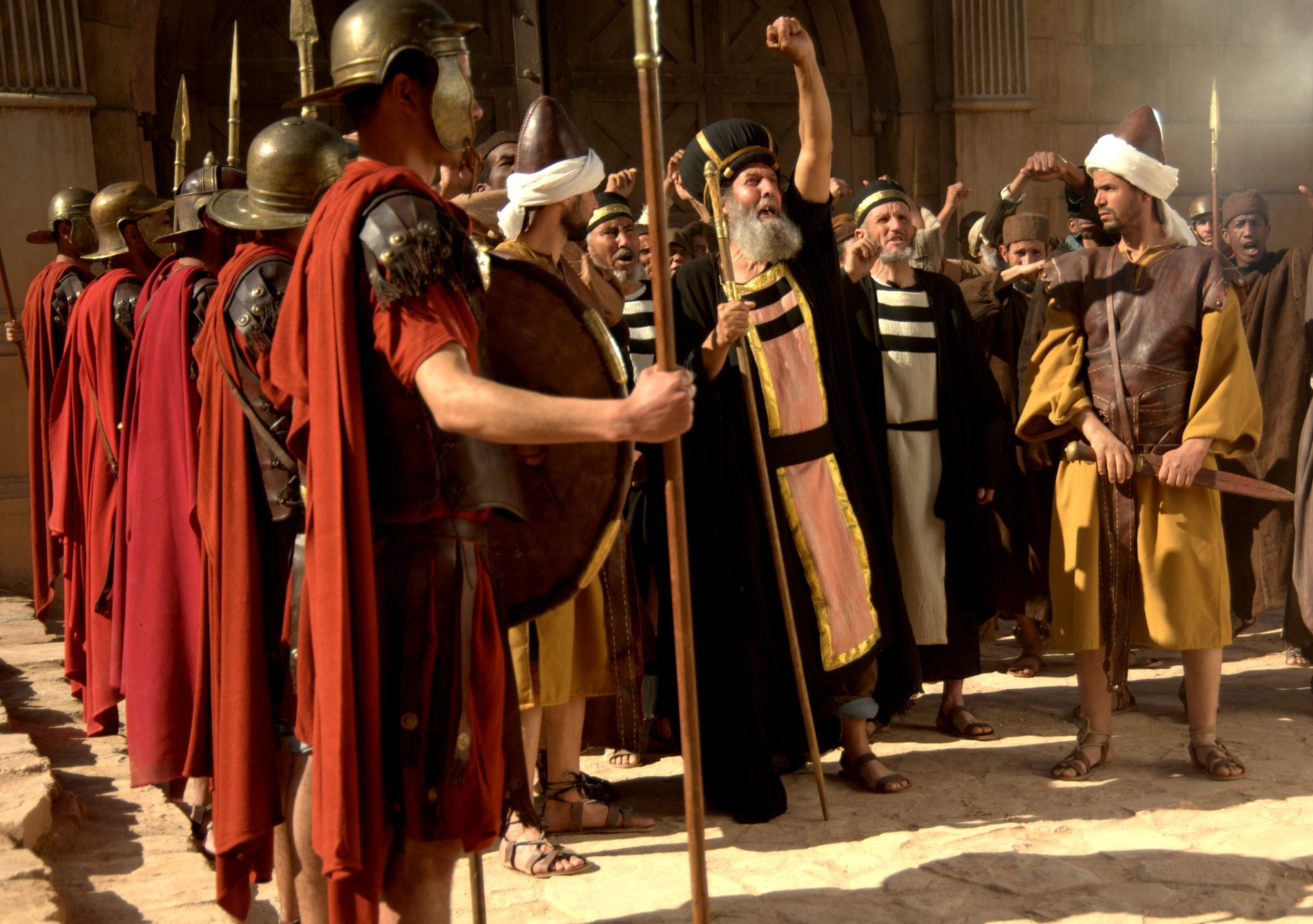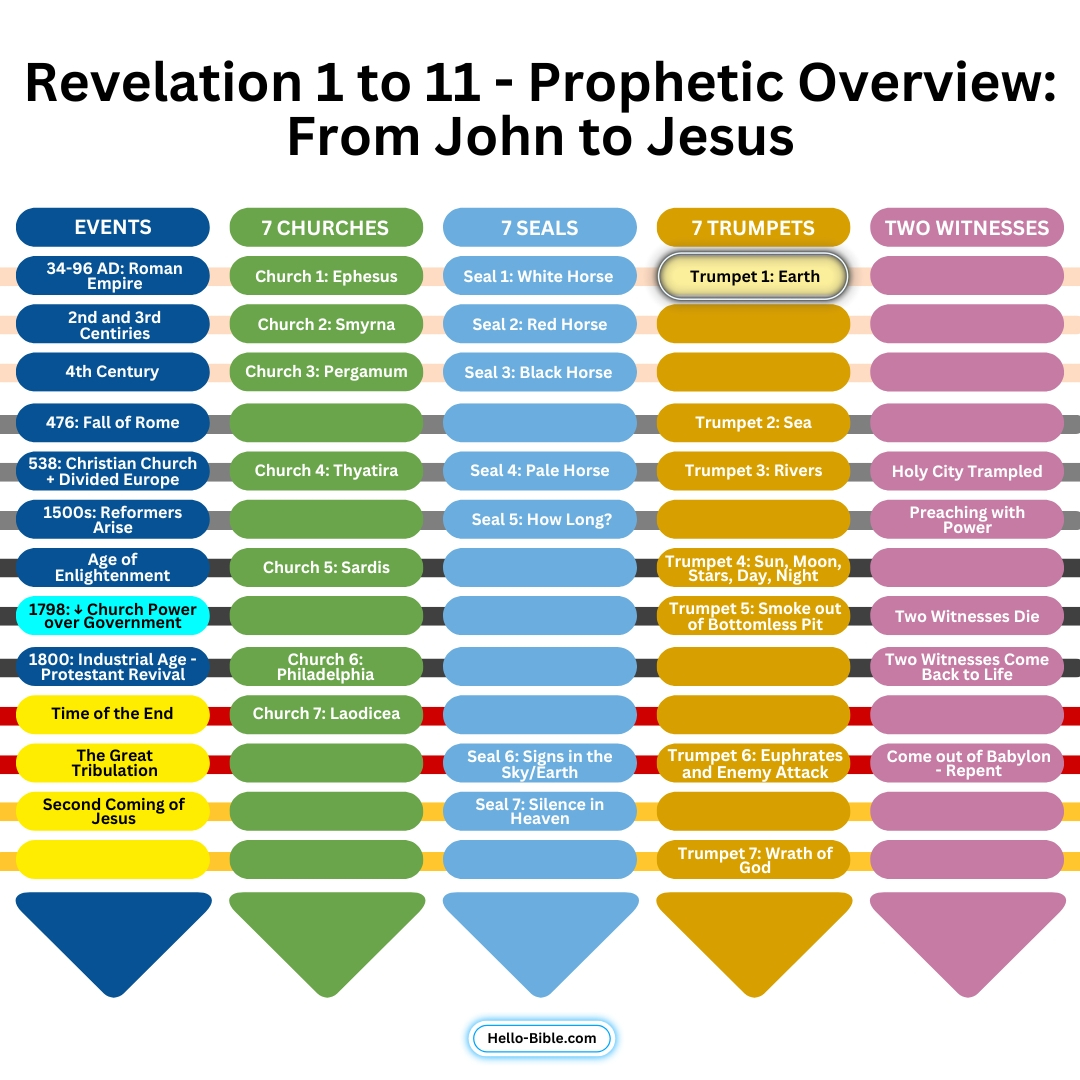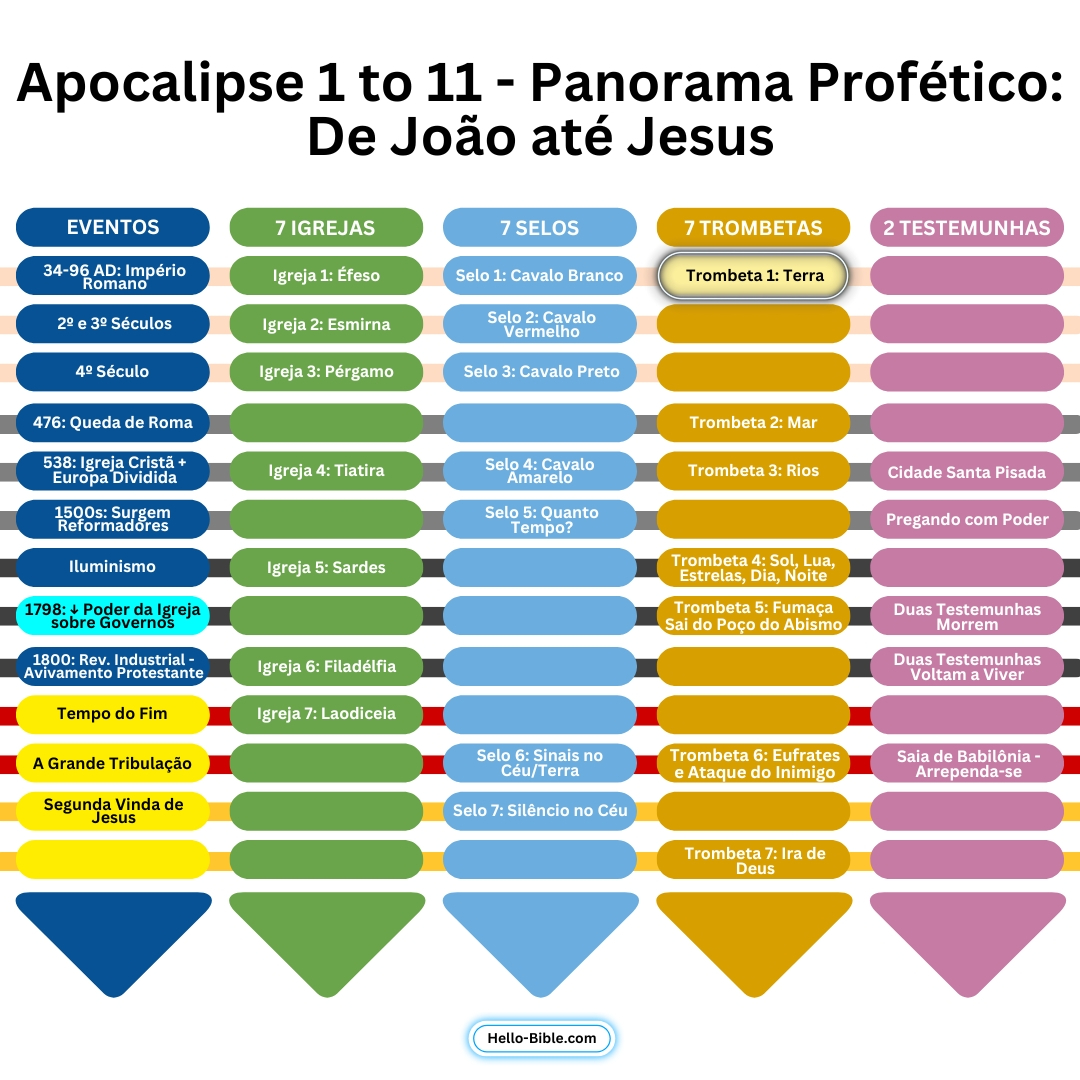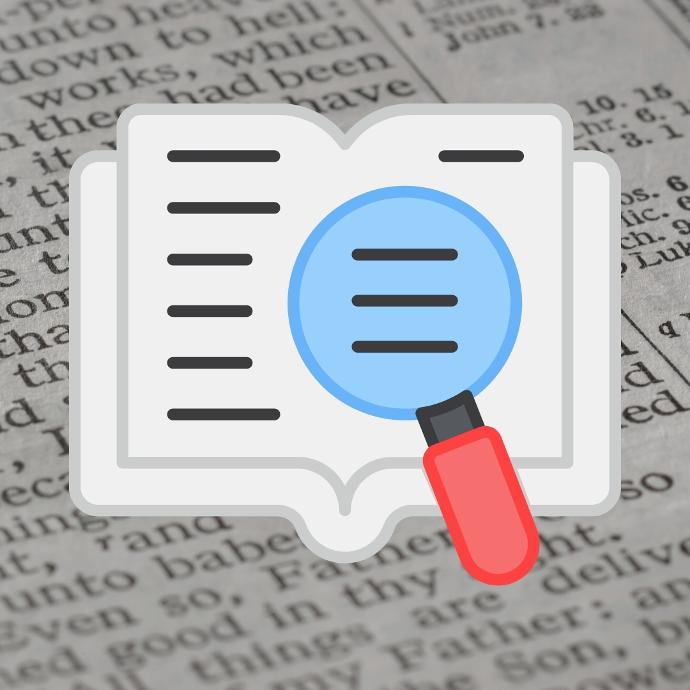Drawing Connections
Seven angels stood before God's throne, each receiving a trumpet. These trumpets were the kind used to sound alarms—warnings from God to grab people's attention and call them to repentance. From John's description of the scene, it's clear that God not only distributed the trumpets but also controlled the timing of when each alarm would be sounded. Having just finished the part of the vision about seven seals, we can only imagine John's anxious anticipation, knowing that every time something was opened in Heaven, it triggered an event on Earth. Would it be the same with the trumpets? Surely, he recognized that something significant was about to unfold, given the role trumpets played in the sanctuary rituals he knew so well.
In today's study, we will delve into the description of the sounding of the first trumpet, exploring its expressions and uncovering the symbols it contains. Some of the expressions will be mentioned multiple times from now on. Let's begin!
Closer Look
*** The angel sounded the trumpet ***: In studies #50 and #51, we learned that the Seven Trumpets are God’s judgements cast on those who rejected the Gospel message during the same prophetic period of the Seven Churches and of the opening of the Seven Seals. The text talking about the first trumpet is only one verse long, but it is packed with information and symbolism. The verse starts with an angel sounding the trumpet which was given to him by God. If the angel is sounding the trumpet, it is because God has determined it is time for him to do so. God is in control of the sounding of the trumpets.
*** Hail and fire mixed with blood ***: In the Old Testament, hail and fire are God’s response to those who stand against Him and His people. Let’s look at some examples from the Old Testament:
- Plagues of Egypt: When Moses was dealing with Pharaoh, to get the people to leave Egypt, one of the plagues God sent was the plague of the hail mixed with fire. It brought tremendous destruction. Exodus 9:16-19,23-25 says: “And indeed for this very cause have I raised you up, to show in you my power; and that my name may be declared throughout all the earth. And yet exalt you yourself against my people, that you will not let them go? Behold, tomorrow about this time I will cause it to rain a very grievous hail, such as has not been in Egypt since the foundation of it even until now. Send therefore now, and gather your cattle, and all that you have in the field; for upon every man and beast that shall be found in the field, and shall not be brought home, the hail shall come down upon them, and they shall die. And Moses stretched forth his rod toward heaven: and the LORD sent thunder and hail, and the fire ran along upon the ground; and the LORD rained hail upon the land of Egypt. So there was hail, and fire mingled with the hail, very grievous, such as there was none like it in all the land of Egypt since it became a nation. And the hail smote throughout all the land of Egypt all that was in the field, both man and beast; and the hail smote every herb of the field, and broke every tree of the field.” God had raised Egypt up, so His glory would be seen. But Egypt directly opposed the chosen people of God, and defied God’s authority. His judgement came over the land. It destroyed the animals that were not sheltered, and destroyed every herb and every tree. And yet, Egypt, in the person of Pharaoh, refused to turn to God in obedience. There are some interesting aspects of the plagues that apply to the trumpets as well. They were only aimed at those who were refusing to follow God’s commands, and who opposed God’s people. The Hebrew camp was not the target of the catastrophic plagues in Egypt, and it was no different during the hail storm (Exodus 9:26). With every plague, God was taking away from the Egyptians, the things that the people held in such high regard, that took the place of God in their society. God was destroying their idols, and that was the judgement being cast on them.
- Prophecy against Gog: Gog was Israel’s enemy that came from the North. In Ezekiel 38:22-23, we read this portion of the prophecy against Gog: “And I will enter into judgment against him with pestilence and with blood; and I will rain upon him, and upon his hordes, and upon the many people that are with him, an overflowing rain, and great hailstones, fire, and brimstone. Thus will I magnify myself, and sanctify myself; and I will be known in the eyes of many nations, and they shall know that I am the LORD.” God’s judgements on His enemies serve to magnify God’s name, so He would be known throughout the World. People would have an opportunity to know that He is the Lord. Once again, we see how the trumpets have a redemption quality to them.
- God’s weapons against the ones who oppress His people: Hail, and fire are weapons of judgement God uses to deal with disobedience and persecution of His chosen ones (Psalm 18:12-14; Isaiah 10:16-19; Isaiah 30:30). In the Old Testament, God sometimes used fire (Psalm 80:14-16; Jeremiah 21:12-14; Ezekiel 15:6-7) or hail (Isaiah 30:30; Ezekiel 13:11-13) as judgement against Israel, when they broke God’s covenant. But fire mixed with hail is consistently God’s weapon against the enemies of His people. God told Job that He has hail stored in Heaven for the time of trouble, and that He is even in control of lightning (Job 38:22-23,35). And so, based on the texts from Job, Ezekiel, Jeremiah, and others), these judgments come from God, and they are aimed at the Earth (Revelation 8:7).
*** One third ***: The quantity “one third” is a contrast to the quantity “one fourth” that we saw in study #47, about the 144,000. The angels were holding one fourth of the Earth (Revelation 7:1). Unlike the four parts that form the entirety of the planet, the third part does not represent the complete picture. When the effects of the first trumpet start to be felt on Earth, only a portion of it is affected. The trumpets are not God’s final and complete judgments on the planet. When the ancient Israel turned to paganism and disobedience, God used His prophets to deliver a message about God’s judgements that would fall over them. Those judgments were to affect one third of the nation (Ezekiel 5:11-12; Zechariah 13:8-9). According to these passages, the goal of the judgments was redemptive: to make the people know that “the Lord has spoken in [His] zeal” and so they would “call on [His] name, and [He] would hear them”. The judgements contained in the first 4 trumpets are always aimed at just one third of the Earth (Revelation 8:7-13), never over all the planet. Revelation 12:4 talks about yet another instance where a third of a group was involved. Satan, the red dragon, took with him one third of the angels, who were referred to as stars. Satan was able to convince them to follow him and be under his control. Revelation 16:19 tells us something interesting about the symbolic Babylon and how God is sending his judgment against it: “And the great city was divided into three parts”. Based on these texts, it seems that one third of the Earth, as referenced in the trumpets, means that a portion of Satan’s domain will be the target of God’s judgments, as an opportunity for the people to repent and turn to God.
*** Trees and green grass burnt up ***: Here we have another interesting symbol. It holds the key to the understanding of this verse. In the Old Testament, we often see people being compared to trees (Psalm 1:3; Psalm 52:8; Psalm 92:12-14; Isaiah 61:3; Jeremiah 11:15-17; Jeremiah 17:7-8; Ezekiel 20:46-48; Daniel 4:20-22) and grass (Psalm 72:16; Isaiah 40:6-8; Isaiah 44:2-4). These symbols were used to describe God’s people who turned away from Him. While on Earth Jesus also used the tree symbolisms, and said that “every tree which brings not forth good fruit is hewn down, and cast into the fire.” (Matthew 7:19). In Luke 23:31, we read about an event that happened on the way to Calvary. Jesus was carrying His cross, when Simon was told to carry it with Jesus. Christ turned to the crowd following Him, and one of the things He said was: “For if they do these things with a green tree, what shall be done with the dry?” Jesus referred to Himself as the green tree, and to the rebellious Jews as dry trees. Now that we have these verses in mind, let’s go back to the text in Revelation. The reference to trees and green grass seem to refer to the spiritual state of the people. When the chosen people of God were still faithful and spiritually alive, there were compared to trees and green grass. But when they abandoned the truth, they became as burnet trees and burnt grass, spiritually dead. These people had broken their covenant with God, and rejected God’s commands. 1 Peter 4:17 says that “judgment must begin at the house of God” (the Israelites). With the sound of the first trumpet, a portion of the apostate church was to be destroyed.
John 1:9-13 says that “[Jesus] was the true Light, that lights every man that comes into the world. He was in the world, and the world was made by him, and the world knew him not. He came unto his own, and his own received him not. But as many as received him, to them gave he power to become the children of God, even to them that believe on his name: Who were born, not of blood, nor of the will of the flesh, nor of the will of man, but of God.” In John 3:17-21, Jesus said: “For God sent not his Son into the world to condemn the world; but that the world through him might be saved. He that believes on him is not condemned: but he that believes not is condemned already, because he has not believed in the name of the only begotten Son of God. And this is the condemnation, that light is come into the world, and men loved darkness rather than light, because their deeds were evil. For everyone that does evil hates the light, neither comes to the light, lest his deeds should be exposed. But he that does truth comes to the light, that his deeds may be made manifest, that they are worked in God.”
Rejected by His own

Attribution: www.LumoProject.com
Love of the darkness is the condemnation that people who reject the Light suffer. Jesus’ own people (the Jewish nation) did not receive Him when He came as a baby and ministered on Earth in person. They were not prepared to receive Him or accept His message, despite all the scriptures and prophecies about the Messiah that were available to them. In a similar way, many people who call themselves christians, but have not truly surrendered their hearts to God, will not be prepared when Jesus comes the second time. They may even be out in the world, apparently preaching about Jesus. But the reality is they never really developed a true relationship with the Lord. Jesus calls the evildoers, and they will be left out of the Kingdom (Matthew 7:21-23).
*** Prophetic Application ***: In general, biblical scholars agree that when Jesus referred to himself as the green tree that was being cut, and to the nation of Israel as dry tree, Christ was referring to the destruction of Jerusalem in 70 AD. The Bible says that “judgment begins at the house of God” (1 Peter 4:17; similar concept found in Ezekiel 9). The first trumpet seems to mark the judgment falling over Jesus’ own people “who received him not” (John 1:11). In the first century, the Jewish nation rejected God’s covenant, and actively opposed and persecuted those who accepted the Gospel. Jerusalem was besieged and destroyed by the Romans.

© Hello-Bible - 2024

© Hello-Bible - 2024
Overview
The sounding of the trumpets is under God’s control. Because of the disobedience and rejection of the Gospel, the people who had originally been chosen for a covenant with the Lord were the first to suffer the consequences of their choice. We can clearly see the prophetic timeline parallel with the Seven Churches and the Seven Seals. The first trumpet is the pouring of God’s judgments, starting with His own, but apostate, house. As it was with all God’s judgments in the Old Testament, He wants to save the people, and bring them back to God. The destruction of the Jewish capital and nation was massive, but it was not complete. Many were still alive and were scattered throughout the world. As a prophecy, the message of this trumpet has already been fulfilled. But it serves as a warning for the end-time people. Outward demonstrations of an apparent belief in the Gospel does not guarantee salvation. Jesus Himself called them evildoers (Matthew 7:21-23). The only way to salvation is to open our hearts to Jesus and accept His sacrifice. We need to receive Him. As we grow spiritually, we will develop a relationship with Him, and we will not need to be afraid of God’s judgements. As Jesus said, “he that believes on Him is not condemned” (John 3:18).
